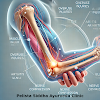Introduction to Insomnia
Insomnia is a common sleep disorder that affects millions of people worldwide. It is characterized by difficulty falling asleep or staying asleep, waking up too early, or feeling unrefreshed after sleep. Insomnia can cause significant distress and negatively impact a person's quality of life. In this article, we will discuss the causes, symptoms, short and long-term effects, as well as natural remedies and alternative treatment methods for insomnia.
 |
| Insomnia: Causes, Symptoms, and Natural Remedies |
What is Insomnia?
Insomnia is a sleep disorder characterized by difficulty falling asleep or staying asleep. It can be classified as acute or chronic. Acute insomnia lasts for a short period of time, usually a few days to a few weeks, and is often related to a stressful event or change in sleep patterns. Chronic insomnia, on the other hand, lasts for more than three months and can be caused by a variety of factors, including medical conditions, psychiatric disorders, and substance abuse.
Causes of Insomnia
Insomnia can be caused by a variety of factors, including:
- Psychological factors: Stress, anxiety, and depression can all contribute to insomnia. These factors can make it difficult to fall asleep and stay asleep, and can also cause early morning awakening.
- Medical conditions: Chronic pain, asthma, and gastrointestinal disorders can all contribute to insomnia. Sleep apnea, a condition in which breathing is interrupted during sleep, can also cause insomnia.
- Lifestyle factors: Poor sleep habits, such as irregular sleep schedules or excessive caffeine intake, can contribute to insomnia. Additionally, working night shifts or traveling across time zones can disrupt sleep patterns and lead to insomnia.
- Medications: Certain medications, such as antidepressants and stimulants, can interfere with sleep and cause insomnia.
Signs and Symptoms of Insomnia
The signs and symptoms of insomnia can vary depending on the type and severity of the condition. Some common signs and symptoms include:
- Difficulty falling asleep
- Difficulty staying asleep
- Waking up too early
- Feeling unrefreshed after sleep
- Daytime fatigue or sleepiness
- Irritability, anxiety, or depression
- Difficulty concentrating or remembering
- Short and Long-Term Effects of Insomnia
Short and long-term effects of Insomnia
Insomnia can have a range of short and long-term effects on a person's health and well-being. In the short term, insomnia can cause daytime fatigue, sleepiness, and difficulty concentrating, which can negatively impact job performance and safety. In the long term, chronic insomnia can increase the risk of developing other health problems, such as depression, anxiety, and cardiovascular disease. Insomnia can also lead to a weakened immune system, making it more difficult to fight off infections.
Natural Remedies for Insomnia
There are several natural remedies that can be effective in treating insomnia, including:
- Establishing a regular sleep schedule: Going to bed and waking up at the same time every day can help regulate the body's internal clock, making it easier to fall asleep and stay asleep.
- Relaxation techniques: Practicing relaxation techniques, such as deep breathing or meditation, before bedtime can help calm the mind and body, making it easier to fall asleep.
- Exercise: Regular exercise can help reduce stress and anxiety and improve sleep quality. However, it is important to avoid exercising too close to bedtime, as this can interfere with sleep.
- Herbal remedies: Certain herbal remedies, such as valerian root and chamomile, have been shown to promote relaxation and improve sleep quality. It is important to talk to a healthcare provider before taking any herbal supplements, as they can interact with other medications.
- Aromatherapy: Certain essential oils, such as lavender and bergamot, have a calming effect on the mind and body and can promote relaxation and sleep.
Alternative Treatment Methods for Insomnia
There are several alternative treatment methods that can be effective in treating insomnia, including:
- Cognitive Behavioral Therapy (CBT): CBT is a form of talk therapy that focuses on identifying and changing negative thought patterns and behaviors that contribute to insomnia. It can be effective in treating both acute and chronic insomnia.
- Acupuncture: Acupuncture involves the insertion of thin needles into specific points on the body. It has been shown to be effective in treating insomnia by promoting relaxation and reducing anxiety.
- Hypnosis: Hypnosis is a relaxation technique that involves guided meditation and suggestion. It can help reduce anxiety and promote relaxation, making it easier to fall asleep.
- Massage therapy: Massage therapy can help reduce muscle tension and promote relaxation, making it easier to fall asleep.
- Light therapy: Light therapy involves exposure to bright light in the morning or evening, depending on the type of insomnia. It can help regulate the body's internal clock and improve sleep quality.
Conclusion
Insomnia is a common sleep disorder that can significantly impact a person's quality of life. It can be caused by a variety of factors, including psychological, medical, and lifestyle factors. There are several natural remedies and alternative treatment methods that can be effective in treating insomnia, including establishing a regular sleep schedule, practicing relaxation techniques, and undergoing cognitive behavioral therapy. It is important to talk to a healthcare provider before starting any new treatment or supplement to ensure it is safe and effective for individual needs.



0 Comments